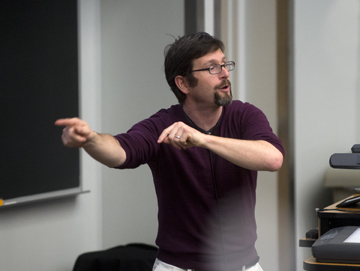Murphy Award winner: George Hollich
April 10, 2013
 |
|
George
Hollich, associate professor of psychological sciences, is a recipient of the 2013
Outstanding Undergraduate Teaching Awards in Memory of Charles B. Murphy.
(Purdue University photo/Mark Simons) |
Six exceptional teachers have been selected as recipients of the 2013 Outstanding Undergraduate Teaching Awards in Memory of Charles B. Murphy. This week, Purdue Today will feature a profile on each of the recipients. Today, we focus on George Hollich, associate professor of psychological sciences.
Sharing the excitement of discovery is George Hollich's favorite part of teaching.
"You can feel the energy in the room when students lean in, and there are these wonderful moments when you can tell they are just as caught up in it as you are," Hollich says. "I literally get goose bumps."
Using self-composed songs, humor, videos and real-life examples along with his personal enthusiasm, Hollich connects to his students by catering to a number of learning styles in his classes on child development and psychology.
"Nobody learns something that they aren't, at some level, motivated to care about, and research says that music, images, and story are all powerful motivators," Hollich says.
Hollich also connects with undergraduate students as the psychology department's director of undergraduate studies, by actively helping students explore majors and opportunities in the field. Additionally, he works to orient incoming international students and serves as a research mentor for undergraduates.
Enhancing motivation is one aspect of Hollich's work as an inaugural member of Instruction Matters: Purdue Academic Course Transformation (IMPACT), which aims to redesign fundamental courses to improve student understanding and engagement
Hollich's own course, Elementary Psychology, was one of the first reformed into a "hybrid" format. Instead of three large lectures each week, students now spend two hours per week using online activities and video lectures and one hour in small recitation sections in nontraditional classrooms.
Compared with the traditional lecture course with 500 students, the hybrid course, with small groups of 50 to 80 students, has seen marked improvements in student attendance, grades, engagement ratings and testing scores.
"These classrooms are the answer to the question: 'Why come to a physical university in this age of unlimited access to information?'" Hollich says.
"They show a side of education that is not better online; there is magic that happens when student and instructors come together to help each other learn, and these courses do that while simultaneously facilitating long-distance collaboration."
Hollich is also active in promoting the IMPACT program across the University, and his enthusiasm for the future of education attracts more professors to learn about transforming their courses.
"I am incredibly excited about these redesigned classrooms," Hollich says. "We are creating the infrastructure that will firmly establish Purdue's reputation as one of the premier places to learn."
Writer: Rachel Florman, rflorman@purdue.edu

